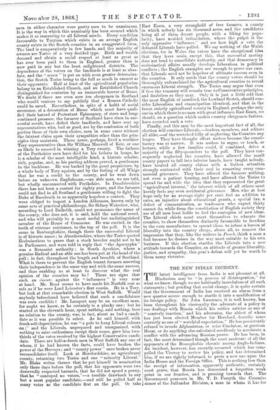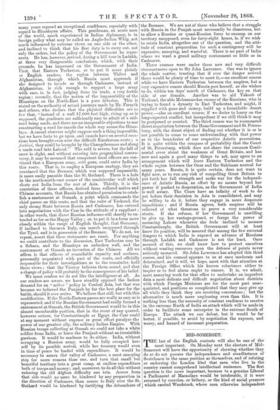THE NEW INDIAN INCIDENT.
THE latest intelligence from India is not pleasant at all. Hindooism may be " in process of disintegration," for what we know, though we are habitually incredulous of all such statements ; but pending that social change, it is quite certain that the Government of India has received an alarm from a new quarter severe enough to startle it into a modification of its foreign policy. Sir John Lawrence, it is well known, has been throughout his viceroyalty the advocate of a policy in our dealings with Russia which his critics satirize as one of " masterly inaction," and his advocates, the ablest of whom has just been elected Member for Hereford, describe more correctly as one of watchful expectation." He has persistently refused to invade Afghanistan, or seize Candaliar, or garrison Herat, or do anything else calculated needlessly to accelerate a conflict with the advancing Russian power. He has been, in fact, the most determined though the most moderate of all the opponents of the Russophobia chronic among Anglo-Indians. An incident, however, has recently occurred which has com- pelled the Viceroy to review his policy, and has determined him, if we are rightly informed, to press a new one upon the India House and the Foreign Office. This is nothing less than the receipt of information, apparently authentic, certainly most grave, that Russia has discovered a forgotten weak point in our frontier, and is pressing towards that. The Government possesses in Mr. T. D. Forsyth the Commis- sioner of the Jullundur Division, a man in whom it has for many years reposed an exceptional confidence, especially with regard to Himalayan affairs. This gentleman, an acute man of the world, much experienced in Indian diplomacy, is in foreign policy what may be called an Anglo-Indian Whig, not much influenced by extreme views on one side or the other, and inclined to think that his first duty is to carry out, not only the orders, but the policy of the Government he repre- sents. He has, however, arrived, during a hill tour in Ladakh, at three very disagreeable conclusions, which, with their grounds, he has impressed on the Government of India. First, that Eastern Turkestan, or to put it more plainly !o English readers, the region between Thibet and Afghanistan, through which Russia must approach if she designed to invade us through Cashmere, instead of Afghanistan, is rich enough to support a large army with ease, is, in fact, judging from its trade, a very fertile region ; secondly, that the notion of the impassability of the Himalayas on the North-East is a pure delusion. This is stated on the authority of actual journeys made by Mr. Forsyth and others, who declare that the physical difficulties are so few that, " instead of a wall 17,000 feet high, rising up as is supposed, the gradients are sufficiently easy to admit of a rail- road being made, and there are no insuperable objections to our constructing a road for camels the whole way across the Hima- laya. A casual observer might suppose such a thing impossible, but we have facts to go upon, and camels have on several occa- sions been brought even over the difficult Karakorum route ; fortiori, they could be brought by the Changchenmoo and along a made road into Lahoul." The cold is severe, but the fall of snow is slight, and without entering into geographical contro- versy, it may be assumed that competent local officers are con- vinced that a European army, with guns, could enter India by this route. That is, to employ a European analogy, they are convinced that the Brenner, which was supposed impassable, is more easily passable than the St. Gothard. There is a hole in the north-north-east corner of the semicircular wall which shuts out India from the rest of Asia. Thirdly, it is the conviction of these officers, derived from collated native and Chinese accounts, that Russia has obtained permission to estab- lish a cantonment at Gumah, a point which commands the chief passes on this route, and that the ruler of Yarkund, the only strong State between Russia and Cashmere, has entered into negotiations with the Czar in the attitude of a suppliant ; in other words, that direct Russian influence will shortly be ex- tended as far as the Happy Valley ; or, to put it in a form more closely within the range of English thought, that Germany, if inclined to threaten Italy, can march unopposed through the Tyrol, and is in possession of the Brenner. We do not, we repeat, assert that these statements are exact. For anything we could contribute to the discussion, East Turkestan may be a Sahara, and the Himalaya an unbroken wall, and the cantonment at Gumah an invention of the Chinese. All we affirm is that officers of remarkable capacity and coolness, personally acquainted with part of the route, and officially responsible for their investigations as to the remainder, hold these views ; that the Viceroy believes them sound, and that a change of policy will probably be the consequence of his belief.
We must confess we do not like the intelligence at all. As our readers are aware, we have steadily opposed the Indian demand for an " active " policy in Central Asia, but that was because we believed the Punjaub by far the best place for the battle, should it ever arrive. We believe that still, but with this modification. If the North-Eastern passes are really as easy as is represented, and if the Russian Government had really formed a cantonment at Gumah, the British Government would be in this almost unendurable position, that in the event of any quarrel, however serious, for Constantinople or Egypt, the Czar could at any moment without expense or great effort paralyze the power of our greatest ally, the military Indian Empire. With Russian troops collecting at Gumah we could not take a white soldier from India, or leave the Punjaub without an irresistible garrison. It would be madness to do either. India, without occupying a Russian army, would be fully occupied her- self by its possible arrival, while her treasury would even in time of peace be loaded with expenditure. It would be necessary to annex the valley of Cashmere, a most annoying step for more reasons than one, and turn that small but beautiful territory into a great camp, at endless expenditure both of troops and money ; and, moreover, to do all this without reducing the old Afghan difficulty one iota. Access from that side would no more be hindered by any preparation in the direction of Cashmere, than access to Italy over the St. Gothard would be hindered by fortifying the debouchure of
the Brenner. We are not of those who believe that a struggle with Russia in the Punjab must necessarily be disastrous, but to allow a Russian or quasi-Russian force to encamp on our territory unopposed, even for forty-eight hours, is, if we wish to retain India, altogether out of the question, and the atti- tude of constant preparation for such a contingency will be expensive, annoying, and wasteful. There is no part of India where we want a grand military cantonment so little as in Cashmere.
Three courses were under these new and very difficult circumstances open to Sir John Lawrence. One was to ignore the whole matter, trusting that if ever the danger arrived there would be plenty of time to meet it,—an excellent course- while we have Eastern Turkestan between the empires, but a. very expensive course should Russia post herself, as she wishes. to do, within ten days' march of Cashmere, the key on that side of our domain. Another was to aid Yakoob of Yarkund, the able Mohammedan enemy of the Russians, who is trying to found a dynasty in East Turkestan, and might, if supplied with guns and money, build up a formidable desert• power,—also an excellent course, if we desire to hurry on the long-expected conflict, but inexpedient if we still think it may be postponed or averted. The third course was to recommend direct negotiation between the Home Governmentand St. Peters- burg, with the direct object of finding out whether it is or is not possible to come to some understanding with that power- as to the boundaries of our respective Asiatic possessions. It is quite within the compass of probability that the Court of St. Petersburg, which does not share the common Conti- nental error about the weakness of Great Britain, and has now and again a good many things to ask, may agree to an arrangement which will leave Eastern Turkestan and the whole region between the Oxus and the Suleiman neutral for many years. Russia, it is quite certain, does not want to fight now, or to run any risk of compelling Great Britain to put forth her full strength and make war for the independ- ence of Asiatic Russia, an effort by no means beyond her power if pushed to desperation, as the Government of India is well aware. The Czars have an infinity of work to do yet before their dominion in Asia is consolidated, and may be willing to do it, before they engage in more desperate expeditions ; and if Russia agrees, both empires will be relieved of what threatens to prove a very considerable strain. If she refuses, if her Government is unwilling to give up her vantage-ground, or forego the power of menacing Lahore whenever she feels inclined to menace• Constantinople, the British Government will at least know its position, will be assured that among the few external dangers to which India is exposed an advance of Russians through Ladakh and Cashmere is not the least. Once assured of this, we shall know how to protect ourselves- without wasting resources upon the defence of points never seriously menaced. Sir John Lawrence has adopted this third course, and his counsel appears to us at once moderate and determined, and it will, we hope, meet with that attention at the Foreign Office which his known reluctance either to- inspire or to feel alarm ought to ensure. It is, we admit, most annoying work for that office to undertake on imperfect data a most delicate and difficult negotiation about districts with which Foreign Ministers are for the most part unac- quainted, and positions so complicated that they may give up all while they think they are receiving concessions ; but the alternative is much more unpleasing even than this. It is nothing less than the necessity of constant readiness to receive in the extreme North of India an attack which will be made in order to facilitate some enterprise in the extreme South of Europe. The attack we can defeat, but it would be far better, if possible, to avoid by negotiation the expense, and worry, and hazard of incessant preparation.







































 Previous page
Previous page